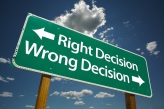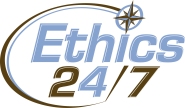Ethical practices in the organization is a responsibility of every employee, which contributes to company values, vision, and perception by everyone on the outside looking in.
Peter Drucker writes that there is only one ethics, one set of rules of morality, one code, that of individual behavior in which the same rules apply to everyone alike. This means that the same rules applies to CEO’s and upper level leadership that hold all levels and employees in the organization, and therefore, every organizational member is responsible for practicing ethics.
So what is Ethics? And, what is the foundation of organizational ethics?
The Markkula Center for Applied Ethics says ethics is two things. One, ethics refers to well-founded standards of right and wrong that prescribe what humans ought to do, usually in terms of rights, obligations, benefi

ts to society, fairness, or specific virtues. Two, ethics refers to the study and development of one’s ethical standards, which requires the constant examination of those standards to insure that they are reasonable and well-founded. Therefore, ethics is the studying of our own moral beliefs and our moral conduct, and striving to ensure that we live according to standards that are reasonable and solidly-based.
Steven Covey, writing in the Forward of the 25th Anniversary Edition of Robert Greenleaf’s Servant Leadership: A Journey into the Nature of Legitimate Power and Greatness, says that it emanates from the natural law that is self-evident and universal. He goes on to say that in all the countries he had visited, there existed a common moral imperative, a knowledge of the difference between right and wrong, good and evil, and acting morally and ethically.
Immanuel Kant, in his Critique of Practical Reason, affirms the existence of a moral law within that makes everyone a “good person” or one who does right things, because it is the right thing to do. He stated: “Two things awe me most, the starry sky above me and the moral law within me.”
Apostle Paul, writing in his first letter of mentorship to his follower Timothy, describes to him the importance of ethical behavior and the problems associated with the individual perception and love of money. He says, “People who want to get rich fall into temptation and a trap and into many foolish and harmful desires that plunge men into ruin and description. For the love of money is the root of all evil.”
Earlier in the book of Mark, Jesus describes that it is not what goes into a man that is the cause of evil behaviors, but that which comes from within, out of man’s heart that causes evil actions – specifically: evil thoughts; sexual immorality, theft, murder, adultery, greed, malice, deceit, lewdness, envy slander, arrogance and folly.
In his latest book entitled “The Moral Basis for Liberty”, Dr. Robert Sirico talks extensively about the foundational ideal and concept of a moral order that extends from the natural law, that is was an important ideal rooted in Greek and Roman thought, and that is was the central foundational philosophy of our Founding Fathers. 
What is the cause of this moral and ethical decline of Business in America?
Kenneth Andrews’ Ethics in Practice, which appeared in the Harvard Business Review on Corporate Ethics, says it can be attributed to the lack of moral development at home, at school, at church, and at work. He writes, “Moral philosophy, which is the proper academic home for ethical instruction, is even more remote, with few professors choosing to teach applied ethics.” Combine the decline of moral and ethical instruction with the steady increase in amoral and unethical practices in today’s media, film and television programming, it is easy to recognize the declining standard of morality and ethics in general.
As a business entity, it becomes imperative that standards and instruction must contain principles and practices on morals and ethics to prevent an ethical breakdown that could even lead to the total failure of a company. The following are steps that can prevent this process from becoming a reality.
Five steps to prevent an ethical breakdown in the organizatio n?
n?
There are five steps organizations can take to help prevent ethical issues and concerns that may arise as a result of behavioral violations of ethical policies and standards.
1. Inspire leadership “Self-Awareness” of organizational ethical standards.
Constant awareness of one’s ethical standards and behaviors are crucial to prevent becoming sidetracked to a more inviting, but unethical practice. One’s personal character must continually reflect his/her moral foundation.
2. Model ethical principles and practices.
Walk-the-Talk. Everything a leader says and does is being constantly viewed and evaluated. The character you exhibit when no one is looking must be a total reflection of the character you model when everyone is looking.
3. Create Ethical Standards of Performance (ESOP).
Ethical standards cannot be assumed, nor can ethical practices. Specific and clear standards must become part of the organizational structure. Emphasis must be outlined that ethical practices apply up and down the organizational hierarchy. Training must contain ethical practices, dilemmas, co nsequences, and decision making practices for full and complete understanding.
nsequences, and decision making practices for full and complete understanding.
4. Build relationships that instill Ethics into Team-building practices.
Discuss morals and ethics with employees during relationship-building encounters. Ask questions about ethical concerns and observations among employees. Build trust to prevent fearfulness of blame for identifying unethical behaviors. Mentor openly and sincerely to improve the ethical awareness of individuals.
5. Publication and periodic review of ethical standards.
Include articles on corporate values and ethical standards in your Newsletters. Educate, model, and reward applicable to measures associated with unethical practices. Review regularly and update as necessary as required to maintain the ESOP.
Leading ethically builds one’s Moral Authority making him/her worthy of respect, inspiring trust and confidence and enabling leaders to lead with high standards of performance. Leaders with accepted moral authority are able with a clear conscience to enforce and maintain organizational standards of performance. Furthermore, leaders are able to mentor poor performer from the heart to improve not only their performance, but also their behaviors.
 To be effective, organizational values, morals and ethical practices must be widely promulgated to all employees, with emphasis on equality of standards and consequences for unethical practices that affect organizational vision and perception in the business community.
To be effective, organizational values, morals and ethical practices must be widely promulgated to all employees, with emphasis on equality of standards and consequences for unethical practices that affect organizational vision and perception in the business community.
Thank you for your comments.
